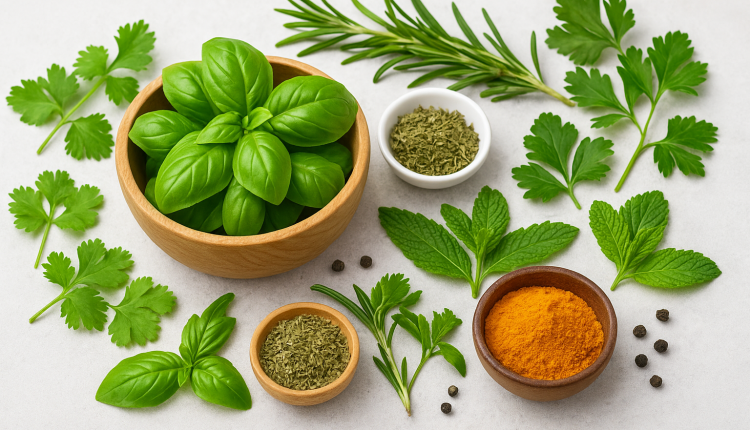In modern nutrition, much attention goes to macronutrients—proteins, fats, and carbohydrates—but the smallest ingredients in your kitchen may hold the greatest potential for wellness. Culinary herbs such as basil, rosemary, turmeric, parsley, and oregano are not just flavor enhancers; they are powerful botanical allies that support digestion, immunity, and longevity. Integrating them into daily meals transforms ordinary food into functional nourishment.
1. The Nutritional Magic Behind Culinary Herbs
Herbs contain dense concentrations of phytonutrients, antioxidants, and essential oils that combat inflammation and oxidative stress. Unlike synthetic supplements, they deliver these compounds in bioavailable, food-based forms. For example, rosemary and thyme contain rosmarinic acid—a potent antioxidant shown to protect cells from free radicals—while basil offers vitamin K, manganese, and eugenol, which supports cardiovascular health.
Regularly consuming herbs provides low-dose, long-term exposure to these compounds, gently supporting the body’s natural detoxification and immune defenses. This subtle synergy is what makes herbs essential for preventive health rather than a quick fix.
2. Digestive Health: The Role of Aromatic Herbs
One of the earliest uses of herbs in traditional medicine was for digestive support. Cumin, coriander, fennel, and mint all promote enzyme activity in the gut, helping break down fats and proteins more efficiently.
Peppermint, in particular, relaxes smooth muscle tissue in the digestive tract, relieving bloating and cramps. Ginger stimulates saliva and bile flow, improving fat metabolism and soothing nausea. The combination of these herbs—often found in Mediterranean or Asian cuisines—helps regulate digestion naturally, making meals not just delicious but therapeutic.
3. Anti-Inflammatory Properties: Nature’s Gentle Medicine
Chronic inflammation underlies many lifestyle diseases, including heart disease, arthritis, and diabetes. Culinary herbs are among the most effective natural anti-inflammatories due to their polyphenol content.
Turmeric, perhaps the most famous, contains curcumin, a compound known for modulating inflammatory pathways. Black pepper enhances curcumin absorption, which is why the two are often used together. Similarly, oregano and thyme offer thymol and carvacrol, compounds that reduce bacterial overgrowth and inflammation in the gut.
Incorporating these herbs daily—through soups, teas, or marinades—creates a cumulative effect that reduces systemic inflammation without side effects.
4. Herbs and Immune Support: Building Everyday Resilience
Herbs play a critical role in supporting immune function by promoting circulation, providing micronutrients, and exhibiting antimicrobial properties. Garlic and onion, while often classified as vegetables, behave more like medicinal herbs due to their sulfur compounds, which help the body detoxify and fight infection.
Basil and parsley, rich in chlorophyll and vitamin C, strengthen white blood cell activity. Meanwhile, sage has antiviral properties, particularly beneficial during cold and flu season. Consuming fresh herbs in salads, juices, or soups offers a gentle but consistent immune boost—an advantage especially important in modern, stress-filled lifestyles.
5. Culinary Herbs and Brain Health: Feeding the Mind
Recent studies have revealed the connection between culinary herbs and cognitive performance. Rosemary, long associated with memory, contains compounds that increase acetylcholine activity in the brain—a neurotransmitter essential for focus and recall.
Turmeric’s curcumin crosses the blood-brain barrier and helps clear amyloid plaques, a feature linked to Alzheimer’s prevention. Even everyday parsley contains apigenin, a compound that supports neuron growth and reduces anxiety.
Incorporating herbs into oils, teas, or dressings can provide a steady flow of neuroprotective nutrients, helping maintain clarity and emotional balance over time.
6. Practical Ways to Integrate Herbs into Your Diet
Herbs are most powerful when used fresh, but dried forms still retain many benefits. To extract their full potential, consider these simple culinary strategies:
- Infused oils: Combine rosemary, basil, or thyme with extra virgin olive oil. Use the mixture for salad dressings or light sautéing.
- Herbal teas: Fresh mint, ginger, or lemongrass steeped in hot water makes a soothing, digestive-friendly beverage.
- Seasonal broths: Add bay leaves, parsley, and turmeric to soups for immune support during colder months.
- Smoothie boosters: Fresh cilantro or basil adds antioxidants and detoxifying chlorophyll to green smoothies.
When possible, grow herbs at home. Even a small windowsill garden provides continuous access to nutrient-rich greens and reduces reliance on store-bought, less potent varieties.
7. Sustainability and Local Herb Cultivation
Choosing locally grown herbs supports biodiversity and ensures freshness. Many imported herbs lose potency during transport, as volatile oils degrade quickly. By cultivating small herb gardens, even indoors, individuals contribute to sustainable food systems while benefiting from fresher, more flavorful ingredients.
Homegrown herbs also reconnect us with food preparation as an act of mindfulness. Harvesting your own basil or rosemary brings awareness to flavor, aroma, and nourishment—a grounding practice in an increasingly fast-paced world.
Conclusion: Reclaiming the Healing Power of Flavor
Culinary herbs are more than seasonings—they are nature’s pharmacy, hidden in plain sight. Incorporating them into daily meals transforms food from mere sustenance into preventive medicine. From turmeric’s anti-inflammatory strength to basil’s calming aroma, each herb carries unique gifts that contribute to balance and vitality.
As modern life accelerates, the simple act of seasoning food with intention becomes a ritual of care—for the body, mind, and planet. By bringing herbs back to the center of our kitchens, we rediscover a timeless truth: that food, when prepared with knowledge and respect for nature’s design, can heal as much as it nourishes.
- Advertisement -

